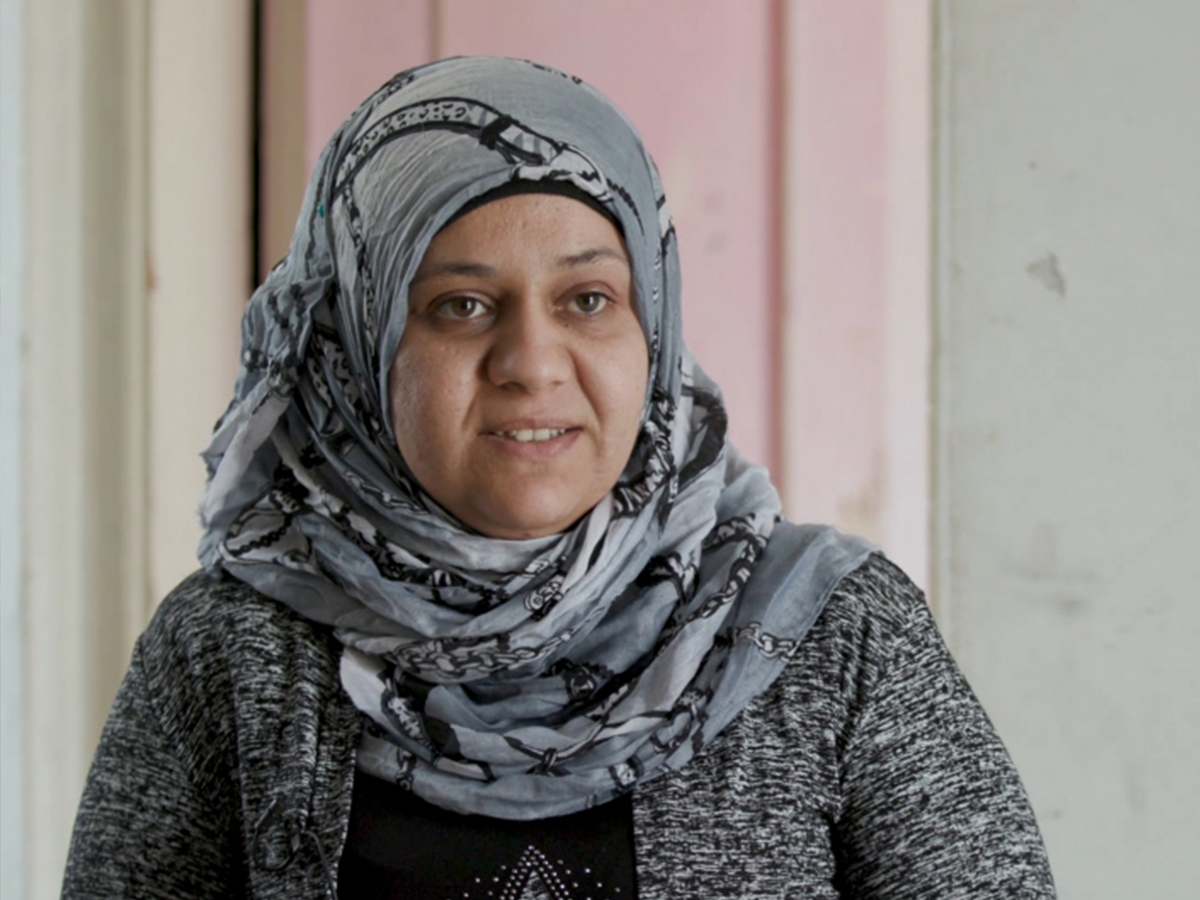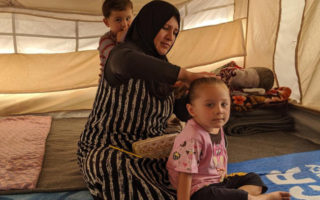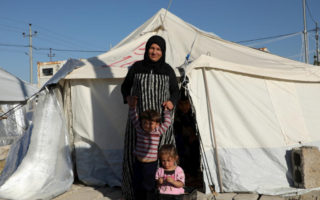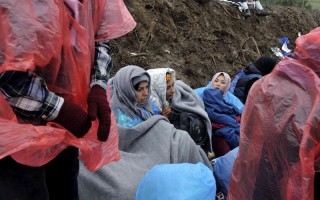
Syrian widow Manar Al Sayer, 29. receives cash assistance in Beirut. © UNHCR
UNHCR is expanding cash-based assistance so that the millions of people that it serves can meet their needs in dignity, are protected and can become more resilient.
Taking a bank card to a cash machine in Beirut, Syrian widow Manar Al Sayer taps in a PIN and withdraws a few Lebanese pounds.
Cash in hand, she can now prioritize her monthly spending for herself and her three children, Aseel, six, Abdullah, nine, and Osaima 12.
“I allocate this cash assistance so that my children can attend the morning shift at school,” she explains.
“I use [it] to pay for my children’s school transport and I am very happy that I am now able to pay for something,” she adds.
Uprooted from her family home in Homs by shelling in 2012, Manar sought refuge in neighbouring Lebanon the following year. After her husband was killed in a traffic accident, she is now head of the family.
“What we buy is no longer imposed on us.”
Once she has taken care of her children’s schooling, Manar can budget for the remainder of the month.
“I promised my children to buy them slippers with part of this month’s cash assistance. So I am going to do that because I have the money,” she adds.
The 29-year-old is among millions of refugees and others of concern in scores of countries worldwide who have been able to take greater control of their lives since UNHCR, the UN Refugee Agency, began expanding cash-based assistance in 2016.
The programme aims to ensure that refugees, asylum-seekers, returnees, internally displaced and stateless people meet their needs in dignity, are protected and can become more resilient.
In the three years between 2016 and 2019 when it ramped up cash assistance, UNHCR – in partnership with governments, UN agencies, NGOs and the private sector – has distributed around $2.4 billion to 20 million vulnerable individuals in more than 100 countries.
With cash now accounting for a greater share of the agency’s assistance than traditional in-kind aid, the shift has resulted in significant changes to UNHCR’s organisation, with some 5,000 internal and partner staff now trained on cash assistance.
Around 95 percent of the money is disbursed without restrictions, meaning that refugees themselves can choose how they spend it. This benefits the local economy with refugees buying essential goods in local stores and paying for local services.
“Before we were restricted to spending the cash assistance in supermarkets. But when they made it available in cash, they gave us the freedom of choice. What we buy is no longer imposed on us,” says Manar.
While she prioritizes spending on her children’s schooling, other people of concern from Greece to Niger and Somalia are using cash assistance to pay their rent, buy medicines, pay off debts or even start businesses. Flexible and innovatory, the initiative is even helping displaced people living in some of the more remote places where UNHCR works, such as camps in Niger.
In the West African country, UNHCR distributed a total of 5,000 mobile phones to refugees and internally displaced people to respond to urgent needs. Using electronic payments – so-called “Mobile Money” – it is assisting men, women and children who fled insecurity in neighbouring Mali and Niger’s border areas.
An SMS message notifies beneficiaries that they have received their assistance. They can then withdraw the cash at the phone shop – a red phone box-sized booth in the camp – or pay for goods directly with their phones in the local stores.
“We’ve seen that providing cash instead of goods is one of the best ways to address refugees’ basic needs here in Niger,” says Robert Heyn, UNHCR’s associate programme officer for cash-based interventions in the country.
“It’s more cost effective, it gives refugees dignity of choice and it also has a very positive impact on the local economy. So it benefits the refugees and the host economy at the same time.”
“It benefits the refugees and the host economy at the same time.”
Refugees in receipt of Mobile Money no longer need to carry cash in their wallet with them, but can access their money “whenever they need it, whenever it’s necessary, and they can also leave money on their mobile money accounts,” says Heyn.
The flexibility and security is welcomed by refugees, among them Zeinabu Warekoufaf from Mali. “When you have your money in your mobile phone, nobody knows what you have and if somebody takes it from you, he won’t know how much you have,” she says.
Visiting a shop at the settlement, Zeinabu uses cash to buy sugar, tea and couscous, as well as skeins of brightly coloured wool from which she make cushions to sell. Many of the shopkeepers have increased their revenue since the refugees started getting money and are happy with the arrangement.
Mobile cash accounts for more than a third of cash assistance globally, and UNHCR hopes that the freedom and security that Mobile Money provides will allow refugees like Zeinabu to leave the camps and integrate into the local community, where they can live in a more independent and sustainable way.
The largest operations to date are in Lebanon, Afghanistan, Jordan, Somalia, Greece, Yemen, Iraq, Egypt, Syria and Turkey, although operations have since rolled out in other countries including Kenya, where it has helped refugees to build their own durable shelters.
As a result of UNHCR’s cash assistance programme, refugees in countries such as Ethiopia, Rwanda, Zambia and Uganda now have access to formal bank and mobile money accounts, a vital stepping stone towards financial inclusion in their host countries.
The cash-based interventions cover the whole arc of displacement, from helping people uprooted within and beyond the borders of their own countries, to assisting those who opt to return home when conditions are safe enough — among them thousands of Somalis.
Nearly three decades of civil war in the Horn of Africa country uprooted more than two million people to neighbouring countries. With security at home improving, more than 90,000 refugees have so far returned voluntarily, for whom cash is proving vital as they restart their lives in their still fragile homeland.
Among beneficiaries is mother of five Aisha, 55, who spent 25 years as a refugee in Dadaab, Kenya. On returning to Somalia in early 2017, she used a reinstallation grant of US$200 to set up a small store in Kismayo, selling everything from bananas and watermelons to pens.
“It allows me to cater to most of my family’s needs.”
“It allows me to cater to most of my family’s needs,” she says of the shop, stocked with items bought from local wholesalers in the country, now getting back on its feet after decades of war and instability.
Others are using their cash grants and assistance to buy land and livestock, or start a business, like 47-year-old Mohamed Noor Omar, who faced an uncertain future in Kakuma Refugee Camp in Kenya after fleeing civil war in his native Somalia in the early 1990s.
He returned to the Somali capital, Mogadishu last year, where he used some of the money to buy a fishing boat. He also partnered with a local man who had an engine to run it.
Out on the water by 6 a.m., he makes US$7 to US$10 a day depending on the catch, and is now looking to improve his business like any other entrepreneur.
“That income is enough to meet my basic requirements,” says Mohamed, who wants to buy better nets to catch more fish, and an outboard motor that can take him further offshore. “That way I can improve my living conditions.”
For more information on UNHCR and cash, please see the 2016-2019 UNHCR Implementation Report on the Policy on Cash-Based Interventions.
Reporting by Rima Cherri and Houssam Hariri in Lebanon, Robert Heyn in Niger, and Urayayi Mustsindikwa in Somalia.
Originally published on UNHCR on 9 December 2019





